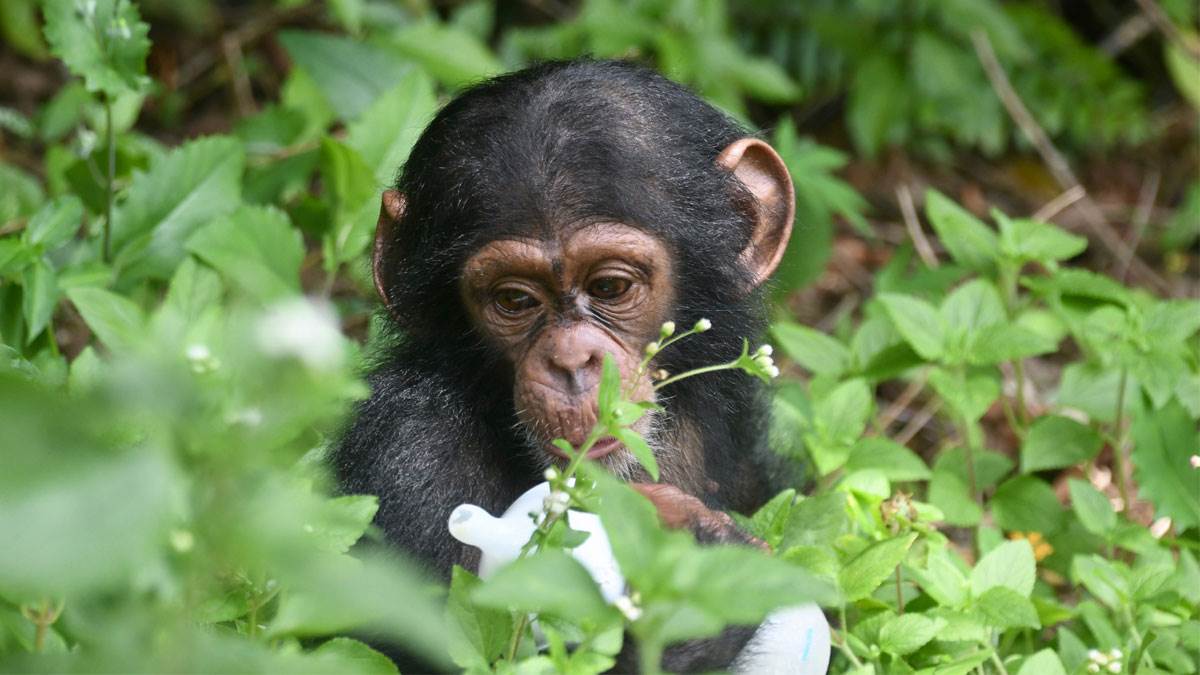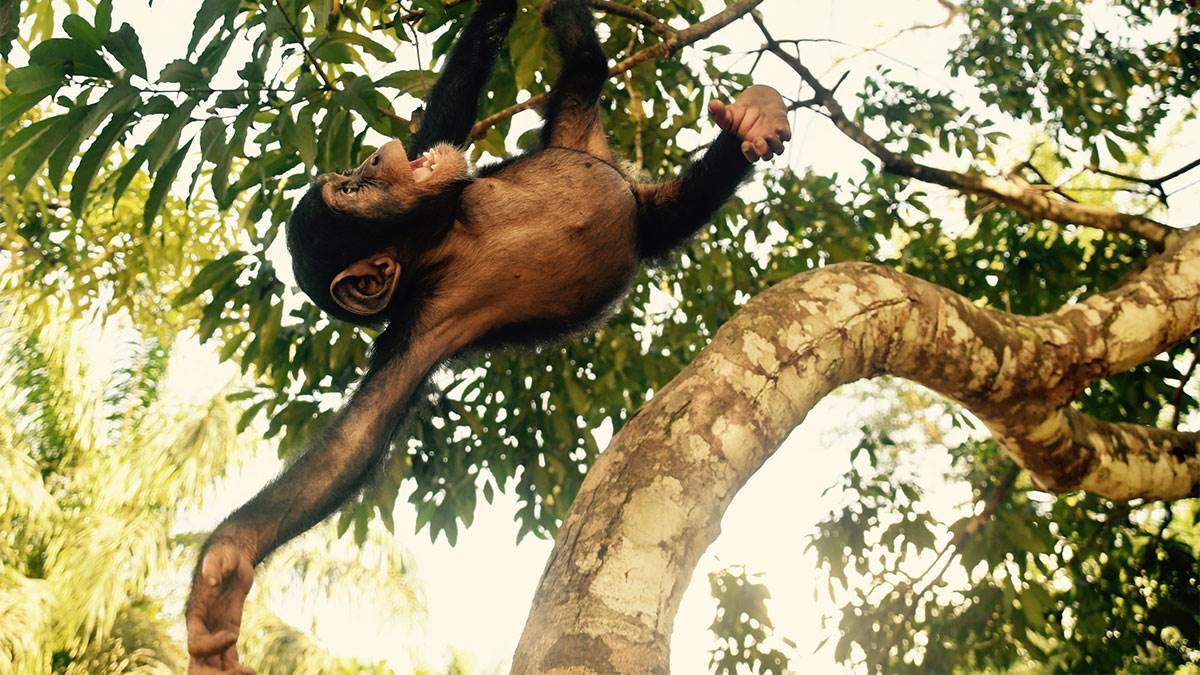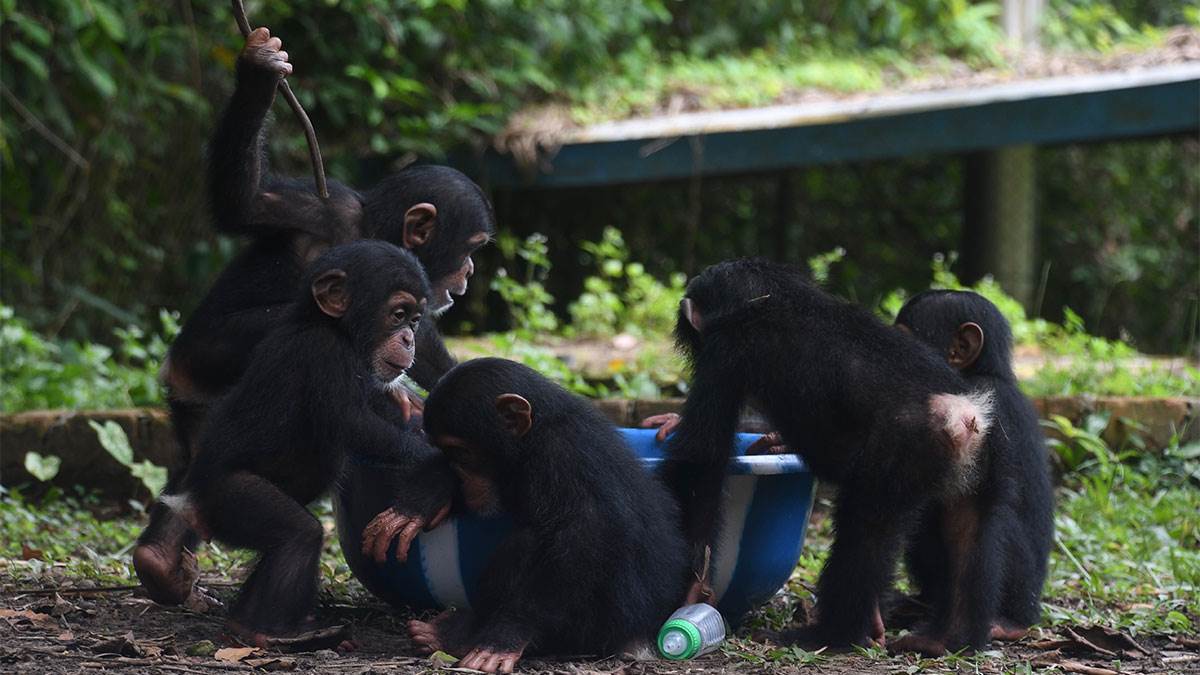Why I love chimps and want you to feel the same
Published on: 25 Gorffennaf 2019 Author: Ben Garrod
For over a decade, Ben Garrod has studied chimpanzees to find ways to protect and conserve them. Now he's written a book for all the family, The Chimpanzee & Me, about this endlessly fascinating species.
 Gloria the chimp tucks into some food
Gloria the chimp tucks into some food
I love chimps. But often people find chimps disconcerting because, despite being so like us, they are capable of aggression and ferocity.
I never know how to address this, because, first of all, we are capable of being more aggressive, scary and destructive than any other member of the animal kingdom. Secondly, it’s partly because of their extreme nature that I love them so much. Yes, they can be pretty scary, but they are also capable of the most tender gestures, the gentlest behaviours and the most touching actions. If their closeness to us on the evolutionary family tree seems disconcerting, then I’m up for embracing that.
Chimpanzees are our closest living relatives and, by being able to spend even a little time alongside them in the wild, we are able to learn not only about them but about ourselves too.
I remember the first time I was lucky enough to see chimps in the wild. I had just seen mountain gorillas and was amazed by how majestic, quiet and apparently peaceful they were. That was a life-changing experience, but left me wanting more in some way, although I couldn’t exactly describe what.
A day later, I saw my first chimps and was blown away. They were noisy, raucous and their energy was like nothing I’d seen before. Within minutes, I could see alliances being formed and worked on, favours being called in and plans hatched between them. I was excited, scared and inspired.
I’ve been lucky enough to spend a lot of time with wild chimps in forests across sub-Saharan Africa. I’ve learned more from them than they ever shall from me, but the one thing I have taken away is that they are hanging off the edge of a precipice, dangling over extinction in a way that no species should be, let alone our closest relatives. We hunt them for their meat on a commercial scale, subject them to the most horrific experiments, enslave them as pets after ripping them away from their families and cut, burn and raze their homes to feed our ever-increasing greed for cheap food, new phones, expensive timber and a whole host of other unacceptable reasons.
Every species deserves its spot on our beautiful planet. If we can’t save chimpanzees, then what chance do we have of saving turtles, frogs, flowers or insects? Many people refer to chimps as "guardians of the forest" but now these guardians need protecting.
5 things you might not know about chimps
 Rebecca the chimp laughing and hanging out
Rebecca the chimp laughing and hanging out
- Chimpanzees are our closest living relatives and we share 98.6% of our DNA with each other. So much so that if you were to line up a chimpanzee, human and gorilla, then the chimpanzee would genetically be more closely related to us than it is to the gorilla.
- There are, technically speaking, two species of chimps – the female-led bonobos which are found only within the Democratic Republic of the Congo, and the more familiar "common" chimpanzee.
- Many of the things that traditionally help to define humans as a species are shared by chimps. We see rich and complex examples of culture across chimpanzee populations, ranging from the way they groom and what they eat, to how they hunt. They have been shown to make and use a wide range of tools, from drinking sponges, to nut-cracking hammers and anvils. Some populations strip long blades of grass to fish out termites from their mounds, and others have been seen to fashion spear-like objects, which they use to catch other animals.
- Chimps are so similar to us that many diseases can be passed between us and chimpanzees. Hepatitis, polio and even the common cold can pass between us and them, so it is important to make sure they do not contract diseases either from neighbouring human populations, or tourists who want to see them in their natural habitats. However, chimpanzees are able to self-medicate and use a range of plants growing in their forest homes to treat everything from intestinal parasites to chest infections.
- We still do not know exactly how many chimps remain in the wild, as it is hard to accurately survey wild apes. We do know that western chimp numbers have dropped by as much as 80% in the last few years among the four subspecies of chimpanzees.
My hero conservationists
 Bath time with the chimps
Bath time with the chimps
When I was growing up, I had no idea who the cool popstars or other celebrities were. Instead, I hero-worshipped renowned conservationists: Gerald Durrell, Jacques Cousteau and, above all, Dr Jane Goodall. She had gone to Tanzania in 1960 with no previous experience and, against all odds, not only changed the way we saw chimpanzees but revolutionised the methods we used to study animals in science. She was the first to document tool-use and hunting in wild chimpanzees. Her legacy continues within the world-renowned Roots & Shoots programme, which inspires, enables and galvanises young people around the globe to make a difference.
I met Jane Goodall at a dinner, where I was serving her food. I was close to finishing my degree and had no real plan about what I’d do next. That encounter changed my life and within a few short months, I was living on the other side of the world, in a tropical forest, surrounded by wild chimpanzees.
That’s the thing about Jane – she changes lives, regardless of age, sex and even species. She has a steely determination and, it seems, has set herself the task of changing hearts and minds around the world, one person at a time. She treats schoolchildren with the same care and respect that she gives to global leaders and, despite being in her 80s, she travels an unbelievable 300 days each year, spreading her message of hope, peace and love to as many people as she can.
More than anything, Jane shows us all how much one person can achieve and the difference that each of us can make.
Topics: 9-11 years, 12+, Non-fiction, Around the world, Animals, Nature, Features






Add a comment